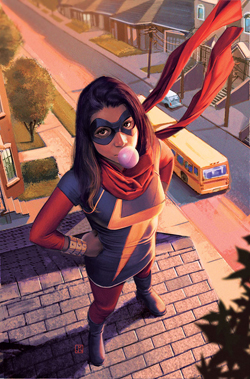Your donation will support the student journalists of The Tide, Richard Montgomery High School's student newspaper. Your contribution will allow us to purchase equipment and cover our annual website hosting costs.
Why ‘Ms. Marvel’ is a superhero for me, an American-Muslim
March 18, 2021

Photo courtesy of Ms. Marvel #2. Art by Jorge Molina.
Disney announced that actress Iman Vellani, an Muslim Pakistani-American, would be playing Kamala Khan in “Ms. Marvel” that’ll come out on Disney+ in late 2021.
In late 2013, Marvel Comics announced their series, Ms. Marvel, would be rebooted with a new lead. Instead of the blonde, All-American Carol Danvers, who starred in the first two series, Muslim and Pakistani-American Kamala Khan would pick up the role—becoming Marvel’s first superhero to get her own comic book. The series is edited by Pakistani-Muslim Sana Amanat and Stephen Wacker, and is written by Muslim convert G. Willow Wilson. Khan is now part of a Marvel initiative to include more diverse superheroes, which includes Miles Morales and Amadeus Cho.
Prior to the initiative, the targeted audience of Marvel comics were white men, which explains why almost every female superhero has Kardashian-like proportions and wears sexy catsuits. As Naomi Wolf wonderfully puts it in her book, The Beauty Myth, “the ideal of the time [was] a gaunt, yet full breasted Caucasian.” Although this stereotype has yet to be permanently discarded to the past, Khan has helped change that image.
Instead of donning a bikini like her fellow heroines, Khan wears a burkini—a tunic-like bathing suit—with a painted yellow lightning bolt to mimic her role model, Captain Marvel, a.k.a. Carol Danvers. When she’s not on duty, Khan usually wears normal clothes. In one scene, though, Khan is seen wearing a shalwar kameez at her cousin’s pre-wedding party. A shalwar kameez is a traditional outfit worn in South Asia. For many, clothes may be insignificant details, but for me, Khan’s wardrobe has made me feel acknowledged.
As a practicing Muslim, it’s important to be modest. In my family, that means no bikinis and lots of burkinis. For a long time, this was an embarrassment. A burkini is nowhere near as flattering as a bikini and I dreaded wearing it. Seeing Ms. Marvel fight crime in her vibrant blue burkini has made me so proud. In this simple choice, she has shown me and hundreds of other Muslim girls that modesty is never something to be ashamed of. On the contrary, it’s something to own that sets me apart from the crowd.
Another aspect of her identity is her Pakistani heritage, which is represented beautifully, especially in the earlier books of the series. In one scene, a flashback shows her great-grandmother, Aisha, running from Bombay during the Partition that separated India and Pakistan. Even though I’m not necessarily Pakistani, seeing someone like Khan pay homage to her heritage has made me proud of mine.
Despite my love for the women of Marvel, particularly Black Widow, I’ve found it hard to relate to them, even during their supposedly “relatable moments.” Kamala Khan is packed with relatability. From her obsession with the Avengers to her not-so-secret crush on friend Bruno to trying to find her place in Islam, Khan is navigating the same ups and downs as many teenagers do. Khan’s a superhero for us, Generation Z.
Khan has also been utilized to fight Islamophobia in the real world, too. In January of 2015, the American Freedom Defense Initiative bought anti-Islamic ads that circled around San Francisco on buses. The ads claimed Muslims hated Jews and compared Islam to Nazism. Graffiti artists painted Ms. Marvel over images of Hitler and Amin al-Husseini, a Palestinian leader. Over the words that said “Islamic-Jew Hatred: It’s in the Quran,” the artists painted messages like “Stamp out racism.” Through this art, Khan became a force for good in both the Marvel universe and ours. She represents equality and justice, which are two ideas our society is still struggling with today.
Ms. Marvel truly isn’t just an illustration of a comic book figure anymore.
In September of 2020, Disney announced fresh-faced Iman Vellani would be playing Kamala Khan in a TV show called “Ms. Marvel” that’ll come out on Disney+ in late 2021. Not only does the series star a Muslim Pakistani-American, but all four directors of the series are POC and two of them are women. Vellani will also reprise the role for “Captain Marvel 2” that is set to be released in 2022.
Ms. Marvel will be Marvel Cinematic Universe’s (MCU) first onscreen Muslim hero to headline her own series, which is a huge step for the Marvel community. As an American-Muslim, I was elated to discover that not only would Khan become a part of the infamous MCU, she would be played be a real Pakistani Muslim.
However, not everyone was happy about this news. Under the Deadline article that reported the show in the first place, angry fans complained about the influx of diversity in the Marvel universe. “If she was cast with a white girl, the left would be up in my arms, screaming for boycotts.” @JediJones said. “Yet we have a steady stream of white characters being cast with actors of different races and they cheer this on.” BBC refers to these people as “gatekeepers,” who are predominantly white men who like Marvel the way it is, and don’t want to welcome new, diverse characters.
To the gatekeepers, I say good riddance. Ms. Marvel has broadened the Marvel Universe. She isn’t a copy of another character as some claim. She’s a witty, dorky and confused Jersey girl who normalizes the American-Muslim post 9/11 experience. Because of her, I feel seen and heard by Disney and Marvel—huge corporations that I didn’t know cared about increased diversity. She represents the new generation of fans, and I can’t wait to see her inspire in her MCU debut.
